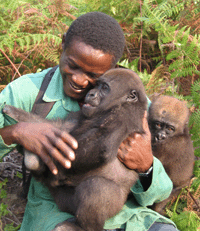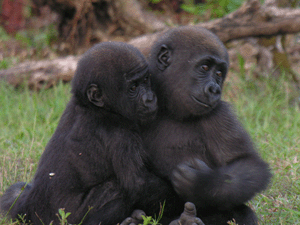|
|
 |
The orphanages are create for:
- To help the authorities which seize the “large monkeys” in their
proposer of the reception facilities for the young orphans. The existence
of these reception facilities encourages the authorities to apply the laws
and the sanctions. If no structure nor no means exists, the agents of
National Forestry Commission know that the seized gorillas are condemned
to die in the more or less short term and thus hesitate to seize them.
- To try to offer to these “cousins” a worthy existence, in freedom or
semi-freedom, nearest to that which they would have lived in their medium
of origin.
- To be used as tool for programs of environmental education and to
contribute to the formation on the conservation.
The Gabonese government clearly posts its will to act for the protection
of the large monkeys.
|
   
  |
Gabon is one of the rare countries of Africa which lodge populations of
gorillas and in particular the species of plain of the west (Gorilla
gorilla gorilla) presents only in some countries of central Africa. The
gorillas are a species headlight as well as regards conservation as a
tourist emblem. Gorillas of plain of the west, as all the subspecies of
gorillas are completely protected by the laws national and international
but they are however victims of the poaching. If they are not always the
specific target of the hunters, they are killed at sight at the time of a
meeting unexpected or taken in the trap.

The gorillas are with the
chimpanzees the most intelligent animals, after the human ones. In natural
environment, they show behaviors sophisticated to find their food and the
search for this one requires very sophisticated cognitive faculties (for
example: mental charts spaces/time and a good memory) and a perfect
knowledge of their medium. Whereas certain forms of the behavior are
innate, the majority are acquired during a long period of training: the
young gorillas remain close to their mothers until adolescence (9 - 10
years). Some of the captive gorillas were born in their natural
environment, and were captured very young people, the majority between 6
months and 3 years, and almost with each capture the mother was killed. So
in supplement of the serious traumatism of the capture, more or less
important according to the age, these individuals were private long
maternal training, necessary to their survival in natural environment.
This educational deficiency was a major obstacle with the programmes of
“reintroduction” of the gorillas because, in the field of ethics, it is
cavity unacceptable to slacken individuals by knowing that they are likely
to die slowly of hunger. |